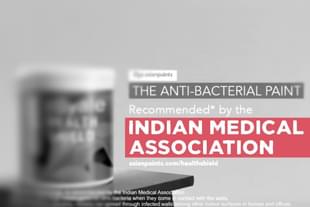News Brief
What Exactly Is The Value Of An IMA Certification?
Swarajya Staff
May 28, 2021, 06:43 PM | Updated 06:43 PM IST
Save & read from anywhere!
Bookmark stories for easy access on any device or the Swarajya app.


News reports of last year that the Indian Medical Association (IMA) endorsed a paint brand, which claimed to be capable of killing “99 per cent bacteria” on the walls; reducing pollution; and protecting immunity have been making rounds on social media.
In May 2020, the product advertisement showed that the paint would protect one from “viral transmissions” and reduce the quantity of harmful gases such as sulphur oxides and nitrogen oxide. It further stated that one need not be safe by sanitising hands and the product would serve as sanitiser for the house. The approval of the IMA was prominently featured in the advertisement.
Similarly, in 2019, IMA certified a so-called anti-microbial LED bulb which claimed to kill 85 per cent germs.
In 2010, IMA had reportedly faced flak for endorsing commercial products like fruit juices, water purifiers, oats, soaps, etc. for crores of rupees. In 2015, another controversy ensued over endorsement of a water purifier.
What does an IMA certification mean?
The website of CorpBiz, a third-party regulatory compliance consultant company, which claims to facilitate the IMA endorsement, lists a series of steps that the product manufacturers need to take to get the certification.
The steps involve device specifications, process and medical production specifications, quality assurance, packaging and labelling, etc.
The website states that there are review criteria that are common to all products, while others are product-specific. The companies should check in which category their product falls. Then, they are required to sign an understanding with IMA Development.
After that, the website states that the companies have to engage one of the verifiers accredited by CorpBiz Developer to carry out merchandise testing and verifying compliance with the criteria.
Once the company receives the approvals, reports and the Verification of Conformity (VOC),it can then apply for the IMA certification by sending all the documents along with a completed application form.
The certification is valid for a certain time period as written in the contract.
After certification, the company can use IMA’s name for the advertisement, promotion, and sale of their medical products.
The website also states that companies have to pay all royalties due from sales of such medical product as agreed with IMA. Also, IMA will make appearances for photography and promotional purposes for the product.
Concerns
IMA is a non-governmental voluntary organisation - registered as a society under the Societies Act of India. It describes itself as the only delegate, national voluntary organisation of 'Doctors of Modern Scientific System of Medicine' in India. In that way, its certification signals scientific validity of the claims made by the products.
However, there is a lack of transparency with regards to the criteria IMA uses for certification, and how it verifies the claims made by the products. The fee charged for the certification also creates conflict of interest, against which, what safeguards have been instituted by the IMA, is unknown.
While legally, IMA office-holders have justified the endorsement by saying that it is legally permissible to raise money through endorsements, several concerns were raised against the IMA endorsement, especially in light of the COVID-19 pandemic.
Experts argued that there was no scientific basis for the claims that applying a coat of paint would kill bacteria or reduce pollution. Critics said that while the IMA was talking about physical distancing, hand hygiene and respiratory etiquette, it was also allowing commercial brands to misuse its name and mislead the public.
Further, IMA signs non-disclosure agreements with the companies it grants certification to, hence the knowledge about how much money was paid for the same remains out of the public domain. Albeit, IMA admits to charging a “processing fee”.
When questioned over certification for the LED bulb with alleged anti-microbial properties in 2019, the IMA secretary general Dr RV Asokan refused to reveal what scientific study the certification was based on; whether it was published in a scientific journal; and who funded the study.
He simply said that claims were evaluated by a committee which clears them for “further processing” if “available literature and/or lab reports” referred to are found credible.





